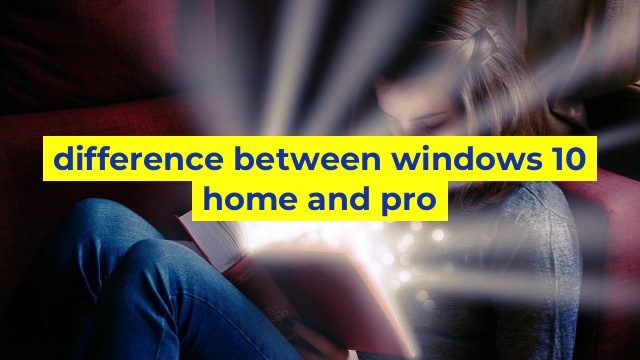The Difference Between Windows 10 Home and Pro
Introduction
When it comes to purchasing a Windows 10 operating system, you’re faced with two choices: Home and Pro. Although there are differences between the two, they are similar in many ways. In this article, we will look at the main differences between Windows 10 Home and Pro.
Features
The features that come with Windows 10 Home and Pro are similar. You get the Start menu, Cortana, Edge, Virtual Desktops, and the ability to run Universal Windows Platform apps. However, Windows 10 Pro has a few additional features that might be useful for businesses or power users. These features include:
- BitLocker encryption: This feature allows you to encrypt your files and drives so they can’t be accessed by unauthorized users.
- Remote Desktop: Windows 10 Pro allows you to connect to another computer remotely and use it as if you were sitting in front of it.
- Hyper-V: This feature allows you to create and run virtual machines on your computer.
- Group Policy Management: Windows 10 Pro allows you to manage how users and computers interact with each other on a network through Group Policy.
Price
One of the main differences between Windows 10 Home and Pro is the price. Windows 10 Home is significantly cheaper than Windows 10 Pro. This is because Windows 10 Pro includes additional features that are geared towards businesses and power users.
Licensing
Another difference between Windows 10 Home and Pro is the licensing. Windows 10 Home is licensed for personal use only, while Windows 10 Pro is licensed for commercial use. This means that if you’re using Windows 10 Pro for business purposes, you’ll need to purchase a commercial license.
Conclusion
In conclusion, Windows 10 Home and Pro are similar in many ways, but Windows 10 Pro includes additional features that are geared towards businesses and power users. If you’re a business owner or power user, it might be worth considering Windows 10 Pro for the additional features. However, if you’re a casual user, then Windows 10 Home will suffice. The choice ultimately comes down to your needs and budget.
Table difference between windows 10 home and pro
| Windows 10 Home | Windows 10 Pro | |
|---|---|---|
| Licensing | Single license for personal use only | Available as a volume license for businesses and organizations |
| Remote access | Can only be accessed through third-party applications | Includes Remote Desktop, allowing remote access to the computer |
| Device security | Includes Windows Defender, Microsoft’s built-in antivirus software | Includes additional security features such as BitLocker encryption and Windows Hello login authentication |
| Group Policy Management | Not available | Allows businesses to enforce policies and settings for multiple devices |
| Client Hyper-V | Not available | Allows virtualization of operating systems and applications on the computer |


